2 months ago
Thursday, July 1, 2010
Kenavo
The whirlwind and the wonder and the disbelief (and a computer too full with images) prompt a post denuded of both images and deep thoughts. But I am holding tight (oh so tight) to these last two days, to the gentle good will and sincere kindness of people we've come to care deeply for, to the beauty of this landscape which changed (with) us, to Eleanor's speaking French, to Iris denying that tomorrow is ever going to really happen to the end, to Oliver dreaming already of Switzerland, to habits which became unconscious, to the ease with which we said "Bonjour messieurs dames" when walking into a store, to not thinking about where we were going, to still being surprised about how to make a haircut appointment, to buying crazy cheeses that bite back, to still wanting to see Monteneuf's megaliths one more time, to imagining the number of times the terraces will fill and empty with laughter and tired travelers, to daydreaming about fall here and the quieting of Brittany, to humming Breton music, to finding the Brittany connection no matter how distant, to knowing life was good really good here, to feeling lucky, to feeling connected thanks to the gracious generosity of our benefactress Brigitte, to being witness to a history that survived history itself, to knowing this survival rode on the voices of oral tradition and the breathing of the biniou, to being in a place that carved out its own pace and place, to the Fountain of Barenton, to la Pointe du Penhir, to the Granite Coast, to the medieval streets of Nantes, to Dinan, to Quimper, to Mont-Saint-Michel, to Trebeurden... I can't name them all. I don't want any of them to slip away. And yet we move now from discovery to memory, and this, I find difficult. Once we have left, once we can start to remember (always a process of simultaneous rejoicing (we were there!) and mourning (but no longer)), there will be great comfort and inspiration. But I wanted our lunch on the island to never end, the conversation to continue, the spring to still unfurl in the garden, the discoveries to emerge, emerge, emerge... Something there was about this place that made us want to give ourselves to it (already I remember the tremulousness rather than feel it), and I think that we did. Now we will have the years ahead to find out how.
Tuesday, June 29, 2010
Hello Goodbye!
Monday, June 28, 2010
Brittany 'till you Drop (Kerguéhennec Redux)
We couldn't stay away from Kerguéhennec (so much fun to say) to see the inside of the manor, but first....
 This is Iris's rendition of her "herrow" on the horse (that horse must have appeared to have been all legs to her!) - complete with cool if puzzling beard braid! So without further ado at all, here is a video extravaganza from our time at the Fête du Cheval at Guer.
This is Iris's rendition of her "herrow" on the horse (that horse must have appeared to have been all legs to her!) - complete with cool if puzzling beard braid! So without further ado at all, here is a video extravaganza from our time at the Fête du Cheval at Guer.
These are the Bagad players that Mac could listen to all day long (and a "woo-hoo!" to Steve and Gina, whose wedding memorably was initiated by awesome bagpipe playing!).
These are the players who told the story of Brittany through dance - I can't tell you what this event is, but bicycles were a big deal during the Resistance (kids on bikes, especially, heroically threaded their way through treacherous terrain on two determined wheels). I really love the music here, and check out how young that kid is singing (in the red shirt on the right) - wonderful.
And here are Oliver and Iris responding to the Ukrainian music with a little jig of their own.
And here, my sweet Iris being a little lavandière (with much elbow grease!)
And finally, her "herrow," this guy who swings himself underneath the horse (!) and then back up - you can see at the end that she is pretty amazed!!!
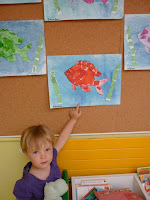 And now mademoiselle Eleanor will bring us back to reality by pointing out her incredibly red goldfish. We received Iris's enormous folder of work from the year thus far, and can't wait for Oliver's and Eleanor's. Eleanor suggested today that perhaps her teachers could come with us. And maybe the whole class, too. That would, of course (especially if we added the town) be the best solution. Much better than our current rationalizations about time passing and being ready for more adventure. I love how kids think. There are these promised continuities in the kids' classes that make it natural to want to talk about the fall here. The little English boy in Eleanor's class just welcomed a baby sister. I spoke to his sweet mom today when I was stunned to see the little one (she was due in mid-July). They're a really interesting family, having moved here from England to completely make their lives here - the dad works over at the abattoir and I believe she stays home (there's a little girl, too, who is now a big sister to the newborn baby), but we very often see him dropping off or picking up his little boy. The new baby is named Isolde, and would have been Tristan had she been a boy. Arthurian legend continues apace, you see, and I can't help but think of this beautiful little family growing here in Josselin long after we're gone, with a poetry that defies the hard work of the abattoir - one of the many reasons, perhaps, for making one's life here.
And now mademoiselle Eleanor will bring us back to reality by pointing out her incredibly red goldfish. We received Iris's enormous folder of work from the year thus far, and can't wait for Oliver's and Eleanor's. Eleanor suggested today that perhaps her teachers could come with us. And maybe the whole class, too. That would, of course (especially if we added the town) be the best solution. Much better than our current rationalizations about time passing and being ready for more adventure. I love how kids think. There are these promised continuities in the kids' classes that make it natural to want to talk about the fall here. The little English boy in Eleanor's class just welcomed a baby sister. I spoke to his sweet mom today when I was stunned to see the little one (she was due in mid-July). They're a really interesting family, having moved here from England to completely make their lives here - the dad works over at the abattoir and I believe she stays home (there's a little girl, too, who is now a big sister to the newborn baby), but we very often see him dropping off or picking up his little boy. The new baby is named Isolde, and would have been Tristan had she been a boy. Arthurian legend continues apace, you see, and I can't help but think of this beautiful little family growing here in Josselin long after we're gone, with a poetry that defies the hard work of the abattoir - one of the many reasons, perhaps, for making one's life here.
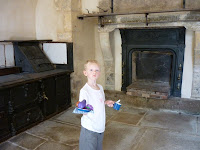 We entered the poetic world of Kerguéhennec once again right after school, knowing that now the manor was open. Oliver wasn't enthusiastic at first, ranking the manor well below a proper castle. Turns out this is the least hierarchical place ever: we saw families in the parks, by the lake (how many of the parents work in Josselin's abattoir, the biggest in France, I wonder), joggers and runners, friends walking and talking. But we had the manor all to ourselves, and the minute we entered its cool hallways, Oliver and the girls were very keen indeed. It's free to get in and they have all sorts of amazing things set up for kids: here's Oliver down in the kitchens preparing a feast (that is one purple eggplant) for the count and countess Lanjuinais and their guests above.
We entered the poetic world of Kerguéhennec once again right after school, knowing that now the manor was open. Oliver wasn't enthusiastic at first, ranking the manor well below a proper castle. Turns out this is the least hierarchical place ever: we saw families in the parks, by the lake (how many of the parents work in Josselin's abattoir, the biggest in France, I wonder), joggers and runners, friends walking and talking. But we had the manor all to ourselves, and the minute we entered its cool hallways, Oliver and the girls were very keen indeed. It's free to get in and they have all sorts of amazing things set up for kids: here's Oliver down in the kitchens preparing a feast (that is one purple eggplant) for the count and countess Lanjuinais and their guests above.
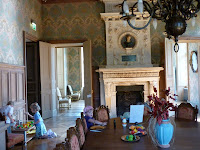 The "Swiss bankers" aspect of the construction of the manor in 1710 was downplayed, with the presentations instead focusing on the late 19th century renovations of Lanjuinais. The manor was bought in 1872 by a Lanjuinais who loved the countryside and loved to hunt. The lay-out of the grounds is beautiful (lots of views of the gardens framed by the architecture) and that of the house as well: small dining room, large dining room, salon, and then, grouped together: fumoir, billiards room and library ("Is that so much to ask in a house?" asked Mac wistfully, knowing that a fumoir addition would be, um, awkward on our house). Here you see the kids being invited to set the table in the big dining room (with its Fontainebleau-inspired fireplace) - they absolutely loved this - Oliver even said that this felt more real than just walking through a fancy place. Amazing what some colorful plastic fruit and gold paper plates will do!
The "Swiss bankers" aspect of the construction of the manor in 1710 was downplayed, with the presentations instead focusing on the late 19th century renovations of Lanjuinais. The manor was bought in 1872 by a Lanjuinais who loved the countryside and loved to hunt. The lay-out of the grounds is beautiful (lots of views of the gardens framed by the architecture) and that of the house as well: small dining room, large dining room, salon, and then, grouped together: fumoir, billiards room and library ("Is that so much to ask in a house?" asked Mac wistfully, knowing that a fumoir addition would be, um, awkward on our house). Here you see the kids being invited to set the table in the big dining room (with its Fontainebleau-inspired fireplace) - they absolutely loved this - Oliver even said that this felt more real than just walking through a fancy place. Amazing what some colorful plastic fruit and gold paper plates will do!
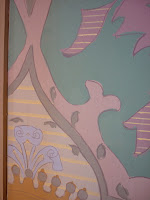 There were two kinds of by-hand work in the small dining room that I really enjoyed thinking through. The first was the wall-paper which was drawn and painted by hand. I loved following the outlines of the ink along the paper. There were massive restorations here in the late 1990 (the before and after photos reveal that the manor had fallen into complete ruin, only the fireplaces and walls and some of the wooden beams left standing).
There were two kinds of by-hand work in the small dining room that I really enjoyed thinking through. The first was the wall-paper which was drawn and painted by hand. I loved following the outlines of the ink along the paper. There were massive restorations here in the late 1990 (the before and after photos reveal that the manor had fallen into complete ruin, only the fireplaces and walls and some of the wooden beams left standing).
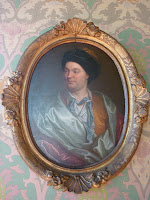 This is another end of the hand-painted spectrum: it's in an Academic style, and part of me could never get tired of looking at the glossy drapery folds and the smooth, rosy skin. The other part of me wonders if this is Lanjuinais himself, or an ancestor from not too far back. 1872 he started planning out what he wanted for the manor (apparently, he was a countryside and good fishing kind of aristocrat - again, Mac had to ask, is that asking so much?). Since the late 19th-century renovations, there have been two more renovation campaigns, but oh the wonders they have wrought!
This is another end of the hand-painted spectrum: it's in an Academic style, and part of me could never get tired of looking at the glossy drapery folds and the smooth, rosy skin. The other part of me wonders if this is Lanjuinais himself, or an ancestor from not too far back. 1872 he started planning out what he wanted for the manor (apparently, he was a countryside and good fishing kind of aristocrat - again, Mac had to ask, is that asking so much?). Since the late 19th-century renovations, there have been two more renovation campaigns, but oh the wonders they have wrought!
 It's a country house, right, and so the beams are wooden, but they are gloriously decorated, complete with nigh inscrutable coats of arms. There's a series of of patterns here that I found truly exceptional - they just flow and move across the surfaces and frame and reframe what you see. (Makes me want to see the Draughtman's Contract for some reason.... hmm). Such a perfect setting.
It's a country house, right, and so the beams are wooden, but they are gloriously decorated, complete with nigh inscrutable coats of arms. There's a series of of patterns here that I found truly exceptional - they just flow and move across the surfaces and frame and reframe what you see. (Makes me want to see the Draughtman's Contract for some reason.... hmm). Such a perfect setting.
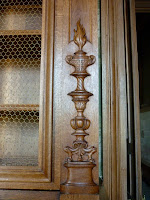 The library was denuded of the 10,000 volumes that had once resided here, (there has to be a story there) and so it was a little sad, but it was a perfect library, complete with "flame o' knowledge" torch carved in wood. To think I used to scoff (well, more like get defensive and silly) at restoration projects. "It's not authentic!" I'd complain inside my head, thereby missing the point that I often think I see now, about Brittany's renewal, about its continuities, about the deep love that aristocrats of the 19th century held for the place (they are actually responsible for most of the restorations that we've seen, not the government - the Count of Lanjuinais, not Viollet-le-Duc, who, I just now realize, is the 19th century restorer whose work I'm used to seeing - that might explain my early reluctance to embrace these). In any case, here is the library with its waiting book cages - I hope that they all fly home soon!
The library was denuded of the 10,000 volumes that had once resided here, (there has to be a story there) and so it was a little sad, but it was a perfect library, complete with "flame o' knowledge" torch carved in wood. To think I used to scoff (well, more like get defensive and silly) at restoration projects. "It's not authentic!" I'd complain inside my head, thereby missing the point that I often think I see now, about Brittany's renewal, about its continuities, about the deep love that aristocrats of the 19th century held for the place (they are actually responsible for most of the restorations that we've seen, not the government - the Count of Lanjuinais, not Viollet-le-Duc, who, I just now realize, is the 19th century restorer whose work I'm used to seeing - that might explain my early reluctance to embrace these). In any case, here is the library with its waiting book cages - I hope that they all fly home soon!
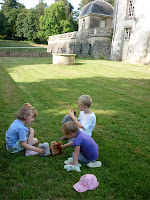 And so what's better on a hot summer day after school and after a manor than playing in the shade after being given two squirrels and a hedgehog. Part of me balked, thinking of the packing (always), but how can I begrudge Oliver a 1.50euro hedgehog which, it turns out, gets along great with squirrels!
And so what's better on a hot summer day after school and after a manor than playing in the shade after being given two squirrels and a hedgehog. Part of me balked, thinking of the packing (always), but how can I begrudge Oliver a 1.50euro hedgehog which, it turns out, gets along great with squirrels!
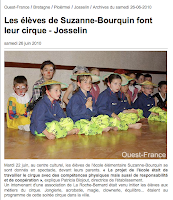 Speaking of Oliver, here is his brush with fame in France! The Ouest-France reporter was indeed out here for the circus performance and snapped this picture in which you can just barely see Oliver's eyes peeking out over the little girls in the front row - he's fourth from the left in this kind of pewter rose vest. And the little girl who is third from the left in the front row wearing that gorgeous outfit is our dear, dear Clementine who has befriended Oliver powerfully and has great, good humor (recall the water pistol fight at the school kermesse!). Hey-wow! My little guy was (pretty much) in the school paper!
Speaking of Oliver, here is his brush with fame in France! The Ouest-France reporter was indeed out here for the circus performance and snapped this picture in which you can just barely see Oliver's eyes peeking out over the little girls in the front row - he's fourth from the left in this kind of pewter rose vest. And the little girl who is third from the left in the front row wearing that gorgeous outfit is our dear, dear Clementine who has befriended Oliver powerfully and has great, good humor (recall the water pistol fight at the school kermesse!). Hey-wow! My little guy was (pretty much) in the school paper!
These are the Bagad players that Mac could listen to all day long (and a "woo-hoo!" to Steve and Gina, whose wedding memorably was initiated by awesome bagpipe playing!).
These are the players who told the story of Brittany through dance - I can't tell you what this event is, but bicycles were a big deal during the Resistance (kids on bikes, especially, heroically threaded their way through treacherous terrain on two determined wheels). I really love the music here, and check out how young that kid is singing (in the red shirt on the right) - wonderful.
And here are Oliver and Iris responding to the Ukrainian music with a little jig of their own.
And here, my sweet Iris being a little lavandière (with much elbow grease!)
And finally, her "herrow," this guy who swings himself underneath the horse (!) and then back up - you can see at the end that she is pretty amazed!!!
 Speaking of Oliver, here is his brush with fame in France! The Ouest-France reporter was indeed out here for the circus performance and snapped this picture in which you can just barely see Oliver's eyes peeking out over the little girls in the front row - he's fourth from the left in this kind of pewter rose vest. And the little girl who is third from the left in the front row wearing that gorgeous outfit is our dear, dear Clementine who has befriended Oliver powerfully and has great, good humor (recall the water pistol fight at the school kermesse!). Hey-wow! My little guy was (pretty much) in the school paper!
Speaking of Oliver, here is his brush with fame in France! The Ouest-France reporter was indeed out here for the circus performance and snapped this picture in which you can just barely see Oliver's eyes peeking out over the little girls in the front row - he's fourth from the left in this kind of pewter rose vest. And the little girl who is third from the left in the front row wearing that gorgeous outfit is our dear, dear Clementine who has befriended Oliver powerfully and has great, good humor (recall the water pistol fight at the school kermesse!). Hey-wow! My little guy was (pretty much) in the school paper!
Sunday, June 27, 2010
Breton Panorama: Fête du Cheval (Guer - Ferme du Vauvert)
 The poster alone is so cool. This was the 20th year of this festival, and they have perfected the experience. Even though it was off the beaten path, they had signs everywhere, they organized three music stands, multiple traditions, and great food, and there was a parade, and dancing and, oh yes, the horses. It was a panorama of Brittany and everywhere we turned was some reminder of some wonderful experience we'd had over the past six months. Merci, monsieur Mac! My little video recorder is low on batteries, so tonight, just the still images - then, fall exhausted into bed for the last packing tomorrow (the next tenants arrive Tuesday evening and we can't wait to play!). Iris says that she doesn't even want us to say the word "Friday," as that will be our last day here, the last day of school for her. She can't stand it. (She also spoke very eloquently at breakfast this morning about her mixed emotions: about sadly wanting this to never end, yet thinking happily of home).
The poster alone is so cool. This was the 20th year of this festival, and they have perfected the experience. Even though it was off the beaten path, they had signs everywhere, they organized three music stands, multiple traditions, and great food, and there was a parade, and dancing and, oh yes, the horses. It was a panorama of Brittany and everywhere we turned was some reminder of some wonderful experience we'd had over the past six months. Merci, monsieur Mac! My little video recorder is low on batteries, so tonight, just the still images - then, fall exhausted into bed for the last packing tomorrow (the next tenants arrive Tuesday evening and we can't wait to play!). Iris says that she doesn't even want us to say the word "Friday," as that will be our last day here, the last day of school for her. She can't stand it. (She also spoke very eloquently at breakfast this morning about her mixed emotions: about sadly wanting this to never end, yet thinking happily of home).Saturday, June 26, 2010
School Kermesse (wow!)
The prizes were amazing! Iris hit "Super Bingo" on the spinning wheel and not only got to blow a horn signaling her good fortune, but also won this beautiful little jewelry set - not plastic, my friends! Oliver scored an official soccer ball (yes, my packing heart stopped for a second) of excellent quality...
Pêche a Pied - Fishing by Feet (Séné)
Look at some of the things we found just by turning over a rock! (granted, a big one)! Starfish (really nice starfish), algae of all kinds, and, I don't know that you can see him here, a fish, too!
Elodie told us again how well Iris was doing with the French. She said (and I'm still marveling at this) that she'd rarely seen a child pick up the language this fast, nor be so determined to do so. The determined part, I get (that's 100% Iris), but the rapidity part surprises me a little, since I'd always thought that kids "pick up" a language effortlessly. I can now say from the experience of the past 6 months, that that isn't actually the case. Bottom line: it's hard work for a kid to learn a language. Eleanor flows seamlessly in and out of a kind of babble French and excellent English, and she understands everything, so in some ways I would say that she's had it the "easiest," but nor would I call her fluent in French - still, she can definitely make herself understood if needed!; Iris has worked and worked, practised and practised and can understand everything and is now working to express herself on really complicated stuff (feelings, etc.); Oliver understands most things (I'm still surprised at what he doesn't understand that the girls do) and speaks very little French (short phrases, things pulled from movies, but never entire conversations like you can have with the girls). It's hard work. And I would guess that Elodie being in the trenches with the kids, and having taught several Anglophone kids would know. The part that filled me with the greatest wonder was that she said that Iris will speak in front of the entire class in French - this is shy, retiring Iris (only in public is she that way, but that's how she is) we're talking about it here. There's definitely been some "coming into her own" for her here. And I don't even know yet the kinds of seeds that have been planted for the kids here - where the French they've picked up will lead them at other points in their lives. Surprises await, I'm sure.
 After all this, what was there to do but go get beautiful Breton fish at the supermarket, eat dinner, look at various bento boxes sites, some quite awesome (my complete fantasy of being able to make food like this for the children's lunches - complete. fantasy - just dreaming here, folks), leave Mac to put the kids to bed, and go out to see my last movie in Josselin, Solutions Locales pour un Désordre Global. The trailer will tell you a lot, and I want to write and write about this, but now it is really rather late (time! ugh!) so I think that I'd just want to say that, like with global warming, the science of the food crisis in in: we eat wildly bizarrely made foods with great consequences to our planet, bodies, and I would even add ethics. The film is incredibly smart, brings in discussions from people who have been working at local solutions for years, and shares the consciousness-raising spirit (but with greater political acumen, scientific knowledge, and a much more in-depth look at the econimics of the multi-national food corporations themselves) of Michael Pollan's The Omnivore's Dilemma. The biggest surprise, however, did not come from the film itself, but rather from the discussion that ensued afterwards. It was an announced discussion, led by people who were practising some of the local solutions discussed in the film (food co-ops, here called AMAPs and original (non-hybrid) seed distributors, and going organic, etc.). I had been quietly aware that almost everyone in the room was 50 and over, which gave me pause (since most food movement discussions in the States attract only really young people - or maybe that's just me living on the college campus, but let's just say that none of the farmers from around Greencastle (and there are many) come to the environmental or food discussions at DePauw). The real surprise came when I slowly realized that almost everyone in the room was somehow involved in farming. Conventional farmers who had gone "biologique" (organic), people who grew some of their own stuff and also helped organized AMAPs, people who were starting to feed livestock grass and natural foods instead of processed cornmeal, people who had decided to become organic farmers 13 years ago and who were just now seeing the fruits of their labors (financially more than literally), and many more. There were two cool language moments: all of them referred to themselves pointedly not as "agriculteurs" (the modern French word for farmer), but rather as "paysans" (which is not exactly "peasant" but has an older ring to it, and also comes with some old-age defiance: the "paysan" culture being one of its own traditions and ways of doing things, thank you very much - quite present in Breton culture of the 19th century, and clearly today!). The other was the wordplay "consom-acteur" - a play on "consommateur" (consumer) and acteur (actor). It's really too bad that we can't do the same wordplay in English (consumactor doesn't really have any ring or sense to it), because I think that the word gets at the gulf that needs to be bridged, the one between food producer and food consumer, one that's particularly enormous in the States. We're members of a food co-op in the States, and not particularly ideological about any of this (friends were doing it, we joined, we loved it). But the more I learn, the more absurd some of the scientific and economic moves are (this is what I wish I could go on about, but will instead hope that you'll read Pollan or see this movie someday if you haven't already), and the more convinced I am that, while absolutely not being able to take on the big multi-national food companies, we can certainly tend our own gardens (more or less figuratively), and feed our children well. And I once again admire Brittany: this land that has had to re-invent its agricultural role and function several times already, I got the sense tonight that there are more of the "local solutions" happening here than elsewhere in France. I would not be surprised if that's the case: Bretons' historical record of endless resourcefulness and reinvention rising to the occasion again. The discussion (people laying out what they've done) and debate (how to get through French bureaucracy which is right up there with global bureaucracy according to the audience) was lively and at the end, I somehow felt compelled to thank people for the conversation and say just a tiny something about the little pockets of local solutions in the States and that there was so much I had learned tonight that I would take back to my friends there (including the challenge of coming up with the equivalent of "consum-acteur"!). My voice was shaking pathetically the whole time, but if not now, when? This was a unique moment. I'm embarassed to tell you that the comments received applause, because they were completely unworthy of such a show of good will. But that is the generosity of spirit that we have been surrounded by these past six months and I will not soon forget this film, and this conversation, and all of its socio-ethico-economic-scientific intricacies or the people trying help us see them to a better tomorrow. I can't.
After all this, what was there to do but go get beautiful Breton fish at the supermarket, eat dinner, look at various bento boxes sites, some quite awesome (my complete fantasy of being able to make food like this for the children's lunches - complete. fantasy - just dreaming here, folks), leave Mac to put the kids to bed, and go out to see my last movie in Josselin, Solutions Locales pour un Désordre Global. The trailer will tell you a lot, and I want to write and write about this, but now it is really rather late (time! ugh!) so I think that I'd just want to say that, like with global warming, the science of the food crisis in in: we eat wildly bizarrely made foods with great consequences to our planet, bodies, and I would even add ethics. The film is incredibly smart, brings in discussions from people who have been working at local solutions for years, and shares the consciousness-raising spirit (but with greater political acumen, scientific knowledge, and a much more in-depth look at the econimics of the multi-national food corporations themselves) of Michael Pollan's The Omnivore's Dilemma. The biggest surprise, however, did not come from the film itself, but rather from the discussion that ensued afterwards. It was an announced discussion, led by people who were practising some of the local solutions discussed in the film (food co-ops, here called AMAPs and original (non-hybrid) seed distributors, and going organic, etc.). I had been quietly aware that almost everyone in the room was 50 and over, which gave me pause (since most food movement discussions in the States attract only really young people - or maybe that's just me living on the college campus, but let's just say that none of the farmers from around Greencastle (and there are many) come to the environmental or food discussions at DePauw). The real surprise came when I slowly realized that almost everyone in the room was somehow involved in farming. Conventional farmers who had gone "biologique" (organic), people who grew some of their own stuff and also helped organized AMAPs, people who were starting to feed livestock grass and natural foods instead of processed cornmeal, people who had decided to become organic farmers 13 years ago and who were just now seeing the fruits of their labors (financially more than literally), and many more. There were two cool language moments: all of them referred to themselves pointedly not as "agriculteurs" (the modern French word for farmer), but rather as "paysans" (which is not exactly "peasant" but has an older ring to it, and also comes with some old-age defiance: the "paysan" culture being one of its own traditions and ways of doing things, thank you very much - quite present in Breton culture of the 19th century, and clearly today!). The other was the wordplay "consom-acteur" - a play on "consommateur" (consumer) and acteur (actor). It's really too bad that we can't do the same wordplay in English (consumactor doesn't really have any ring or sense to it), because I think that the word gets at the gulf that needs to be bridged, the one between food producer and food consumer, one that's particularly enormous in the States. We're members of a food co-op in the States, and not particularly ideological about any of this (friends were doing it, we joined, we loved it). But the more I learn, the more absurd some of the scientific and economic moves are (this is what I wish I could go on about, but will instead hope that you'll read Pollan or see this movie someday if you haven't already), and the more convinced I am that, while absolutely not being able to take on the big multi-national food companies, we can certainly tend our own gardens (more or less figuratively), and feed our children well. And I once again admire Brittany: this land that has had to re-invent its agricultural role and function several times already, I got the sense tonight that there are more of the "local solutions" happening here than elsewhere in France. I would not be surprised if that's the case: Bretons' historical record of endless resourcefulness and reinvention rising to the occasion again. The discussion (people laying out what they've done) and debate (how to get through French bureaucracy which is right up there with global bureaucracy according to the audience) was lively and at the end, I somehow felt compelled to thank people for the conversation and say just a tiny something about the little pockets of local solutions in the States and that there was so much I had learned tonight that I would take back to my friends there (including the challenge of coming up with the equivalent of "consum-acteur"!). My voice was shaking pathetically the whole time, but if not now, when? This was a unique moment. I'm embarassed to tell you that the comments received applause, because they were completely unworthy of such a show of good will. But that is the generosity of spirit that we have been surrounded by these past six months and I will not soon forget this film, and this conversation, and all of its socio-ethico-economic-scientific intricacies or the people trying help us see them to a better tomorrow. I can't.
Thursday, June 24, 2010
Bliss (Kerguéhennec)
There is one sad note about the Domaine de Kerguéhennec, and that is that while the castle and sculpture park will stay, the Center for Contemporary Art will close. Apparently, the Conseil Général du Morbihan will no longer be supporting it, and the support of the State and the Région Bretagne aren't enough. I went to the petition website and some 4000 people have signed the petition. Sigh - that will be very much too bad if it closes, as the presence of contemporary art in Brittany is a rare one. The presence of contemporary art in a setting such as this one in Brittany is utterly unique. Well, we have plans to go back and see the castle and the center (while we can). The castle, it seems, was built in the 18th century for Swiss bankers - could there be a better building segue for our trip to Switzerland which starts (ee gads) next Friday afternoon? Poetry!
Subscribe to:
Posts (Atom)